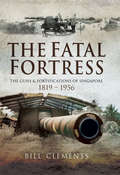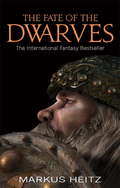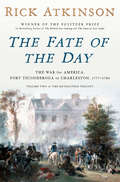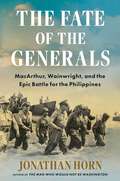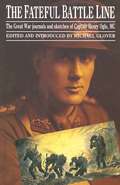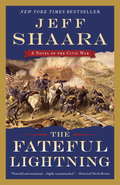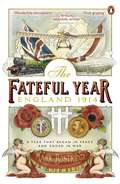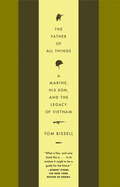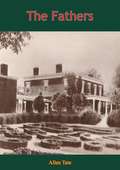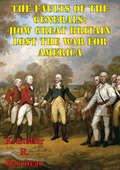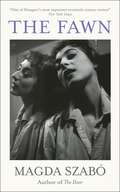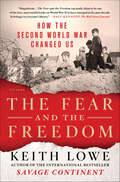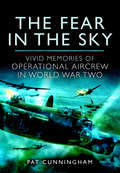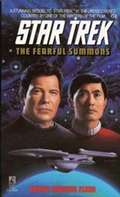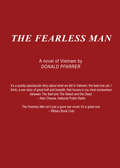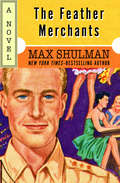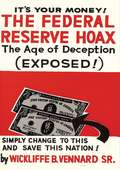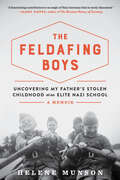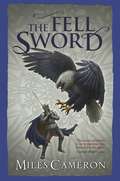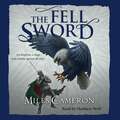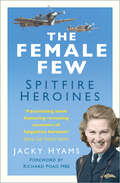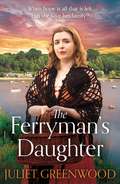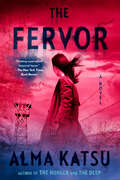- Table View
- List View
The Fatal Fortress: The Guns and Fortifications of Singapore 1819–1953
by Bill ClementsThe military historian presents a fascinating reassessment of Britain&’s Singapore Naval Base and the WWII Battle of Singapore. The Fall of Singapore in February 1942 was arguably the greatest disaster suffered by the British Empire. Between 1923 and 1938, the Singapore naval base had been upgraded with some of the largest coast guns ever installed. But the guns&’ design and incorrect siting have since been blamed for the humiliating loss during World War II. In The Fatal Fortress, Bill Clements traces the history of Singapore&’s armaments from the city&’s founding in 1819 to the demise of coast artillery in the British Army in 1953. He also follows the development of artillery through the Victorian era of muzzleloading guns to the introduction of breechloading guns in the twentieth century. Clements argues that it was not the siting of the guns that brought about the fall of Singapore, but an overall failure in command and control and a lack of suitable ammunition. This volume is illustrated throughout with photographs, drawings and plans, and contains a gazetteer describing all the batteries and forts, both existing and demolished. There is also an annex giving the details of the guns that were installed in Singapore.
The Fate Of The Dwarves: Book 4 (Dwarves #4)
by Markus HeitzFor the last time, the dwarves are going to war - and the outcome will decide the fate of their race. There has been no word from the brave warrior Tungdil since the vicious battle at the Black Abyss. Dragons, magicians, and the malevolent älfar have advanced far into the kingdom of Girdlegard, ruthlessly seizing vast areas of land. The dwarves seem to be facing their next battle with little hope of survival. But then the inexplicable happens. A dwarf dressed in black armour returns from the abyss with a formidable army in tow. He calls himself Tungdil, and for his most loyal friend Ireheart and his allies, this means a new hope. But soon doubts begin to arise . . . Could this really be Tungdil, or is this warrior following his own dark agenda? It is a question of the future of Girdlegard - and the future of all the dwarves.The concluding novel in the international bestselling Dwarves series.Other books by Markus Heitz:The DwarvesThe War of the DwarvesThe Revenge of the DwarvesThe Triumph of the DwarvesRighteous FuryDevastating HateDark PathsRaging StormAera book's one to ten
The Fate Of The Earth
by Jonathan SchellDefining the shape and the dimensions of the nuclear predicament.
The Fate of the Day: The War for America, Fort Ticonderoga to Charleston, 1777-1780
by Rick AtkinsonIn the second volume of the landmark American Revolution trilogy by the Pulitzer Prize–winning and #1 New York Times bestselling author of The British Are Coming, George Washington’s army fights on the knife edge between victory and defeat. <p> The first twenty-one months of the American Revolution—which began at Lexington and ended at Princeton—was the story of a ragged group of militiamen and soldiers fighting to forge a new nation. By the winter of 1777, the exhausted Continental Army could claim only that it had barely escaped annihilation by the world’s most formidable fighting force. <p> Two years into the war, George III is as determined as ever to bring his rebellious colonies to heel. But the king’s task is now far more complicated: fighting a determined enemy on the other side of the Atlantic has become ruinously expensive, and spies tell him that the French and Spanish are threatening to join forces with the Americans. <p> Prize-winning historian Rick Atkinson provides a riveting narrative covering the middle years of the Revolution. Stationed in Paris, Benjamin Franklin woos the French; in Pennsylvania, George Washington pleads with Congress to deliver the money, men, and materiel he needs to continue the fight. In New York, General William Howe, the commander of the greatest army the British have ever sent overseas, plans a new campaign against the Americans—even as he is no longer certain that he can win this searing, bloody war. The months and years that follow bring epic battles at Brandywine, Saratoga, Monmouth, and Charleston, a winter of misery at Valley Forge, and yet more appeals for sacrifice by every American committed to the struggle for freedom. <p> Timed to coincide with the 250th anniversary of the beginning of the Revolution, Atkinson’s brilliant account of the lethal conflict between the Americans and the British offers not only deeply researched and spectacularly dramatic history, but also a new perspective on the demands that a democracy makes on its citizens. <b>New York Times Bestseller</b>
The Fate of the Generals: MacArthur, Wainwright, and the Epic Battle for the Philippines
by Jonathan HornIn the tradition of Hampton Sides&’s bestseller Ghost Soldiers comes a World War II story of bravery, survival, and sacrifice—the vow Douglas MacArthur made to return to the Philippines and the oath his fellow general Jonathan Mayhew Wainwright made to stay with his men there whatever the cost.For the doomed stand American forces made in the Philippines at the start of World War II, two generals received their country&’s highest military award, the Medal of Honor. One was the charismatic and controversial Douglas MacArthur, whose orders forced him to leave his soldiers on the islands to starvation and surrender but whose vow to return echoed around the globe. The other was the gritty Jonathan Mayhew Wainwright, who became a hero to the troops whose fate he insisted on sharing even when it meant becoming the highest-ranking American prisoner of the Japanese. In The Fate of the Generals, bestselling author Jonathan Horn brings together the story of two men who received the same medal but found honor on very different paths. MacArthur&’s journey would require a daring escape with his wife and young child to Australia and then years of fighting over the thousands of miles needed to make it back to the Philippines, where he would fulfill his famous vow only to see the city he called home burn. Wainwright&’s journey would take him from the Philippines to Taiwan and Manchuria as his captors tortured him in prisons and left him to wonder whether his countrymen would ever understand the choice he had made to surrender for the sake of his men. A story of war made personal based on meticulous research into diaries and letters including boxes of previously unexplored papers, The Fate of the Generals is a vivid account that raises timely questions about how we define honor and how we choose our heroes, and is destined to become a classic of World War II history.
The Fateful Alliance: France, Russia, and the Coming of the First World War
by George F. KennanA compelling book about the true cause of the First World War as told by Kennan in this concise and well-researched historical book.
The Fateful Battle Line: The Great War Journals and Sketches of Captain Henry Ogle, MC
by Michael GloverThe diaries of front-line soldiers of the Great War are relatively commonplace; contemporary drawings and paintings, other than those by the official war artists, are less so. What is extraordinary, even unique, about The Fateful Battle Line is that it combines a journal of infantry service on the Western Front with sketches and finished work made at the time, often illustrating places, people and incident from the text. Henry Ogle was a trained artist, and one who, in his writing, fused the vividness of the painter's eye for detail with a writer's precision and awareness. Commissioned from the ranks, twice wounded, his gallantry rewarded with the Military Cross, he endured four years of war; if the experience seared him, it never took from him his humanity. Front-line, support and reserve trenches; raids, patrols and work details; outposts and piquets; hospitals and base areas; French and Belgian towns and villages; leave back home in England ; the tragic landscape of Flanders; weapons, artillery, transport, draft and riding animals; above all his fellow soldiers - Henry Ogle faithfully, and often wittily, recorded the day-to-day minutiae, as well as the sudden shattering moments, of vast industrial armies locked in the last of the great siege wars. In doing so, and in his accompanying text, he demonstrated that the enduring legacy of the Great War lay in the spirit of the men who fought it. Skillfully edited and annotated by the late Michael Glover, The Fateful Battle Line is perhaps the most remarkable and enduring original work to have come out of the First World War in the last fifty years.
The Fateful Lightning
by Jeff ShaaraFrom New York Times bestselling author Jeff Shaara comes the riveting final installment in the Civil War series that began with A Blaze of Glory and continued in A Chain of Thunder and The Smoke at Dawn. November 1864: As the Civil War rolls into its fourth bloody year, the tide has turned decidedly in favor of the Union. A grateful Abraham Lincoln responds to Ulysses S. Grant's successes by bringing the general east, promoting Grant to command the entire Union war effort, while William Tecumseh Sherman now directs the Federal forces that occupy all of Tennessee. In a massive surge southward, Sherman conquers the city of Atlanta, sweeping aside the Confederate army under the inept leadership of General John Bell Hood. Pushing through northern Georgia, Sherman's legendary "March to the Sea" shoves away any Rebel presence, and by Christmas 1864 the city of Savannah falls into the hands of "Uncle Billy." Now there is but one direction for Sherman to go. In his way stands the last great hope for the Southern cause, General Joseph E. Johnston. In the concluding novel of his epic Civil War tetralogy, Jeff Shaara tells the dramatic story of the final eight months of battle from multiple perspectives: the commanders in their tents making plans for total victory, as well as the ordinary foot soldiers and cavalrymen who carried out their orders until the last alarum sounded. Through Sherman's eyes, we gain insight into the mind of the general who vowed to "make Georgia howl" until it surrendered. In Johnston, we see a man agonizing over the limits of his army's power, and accepting the burden of leading the last desperate effort to ensure the survival of the Confederacy. The Civil War did not end quietly. It climaxed in a storm of fury that lay waste to everything in its path. The Fateful Lightning brings to life those final brutal, bloody months of fighting with you-are-there immediacy, grounded in the meticulous research that readers have come to expect from Jeff Shaara. Praise for Jeff Shaara's new Civil War series The Fateful Lightning "Outstanding . . . Shaara combines his extensive knowledge of military history with his consummate skill as a storyteller to vivify [Sherman's March to the Sea]. . . . The Union and Confederate strategies, tactics, and points of view are both represented, providing a measure of balance and clarity to a campaign that is often viewed through a lopsided lens. By concentrating on the western theater throughout this series, Shaara has opened a welcome literary window to some of the less familiar Civil War battles and campaigns."--Booklist A Blaze of Glory "[An] exciting read . . . This novel is meticulously researched and brings a vivid reality to the historical events depicted."--Library Journal "Dynamic portrayals [of] Johnston, Grant and William Tecumseh Sherman."--The Wall Street Journal A Chain of Thunder "Shaara continues to draw powerful novels from the bloody history of the Civil War."--Kirkus Reviews "Shaara's historical accuracy is faultless. . . . The voices of these people come across to the reader as poignantly clear as they did 150 years ago."--Historical Novels Review The Smoke at Dawn "Beautifully written . . . Shaara once again elevates history from mere rote fact to explosive and engaging drama."--BookreporterFrom the Hardcover edition.
The Fateful Year: England 1914
by Mark BostridgeThe Fateful Year by Mark Bostridge is the story of England in 1914. War with Germany, so often imagined and predicted, finally broke out when people were least prepared for it. Here, among a crowded cast of unforgettable characters, are suffragettes, armed with axes, destroying works of art, schoolchildren going on strike in support of their teachers, and celebrity aviators thrilling spectators by looping the loop. A theatrical diva prepares to shock her audience, while an English poet in the making sets out on a midsummer railway journey that will result in the creation of a poem that remains loved and widely known to this day. With the coming of war, England is beset by rumour and foreboding. There is hysteria about German spies, fears of invasion, while patriotic women hand out white feathers to men who have failed to rush to their country's defence. In the book's final pages, a bomb falls from the air onto British soil for the first time, and people live in expectation of air raids. As 1914 fades out, England is preparing itself for the prospect of a war of long duration.Mark Bostridge won the Gladstone Memorial Prize at Oxford University. His first book Vera Brittain: A Life was shortlisted for the Whitbread Biography Prize, the NCR NonFiction Award, and the Fawcett Prize. His books also include the bestselling Letters from a Lost Generation; Lives for Sale, a collection of biographers' tales; Because You Died, a selection of Vera Brittain's First World War poetry and prose; and Florence Nightingale: The Woman and her Legend, which was named as a Wall Street Journal Best Book of 2008 and awarded the Elizabeth Longford Prize for Historical Biography. The Fateful Year was shortlisted for the PEN Hessell-Tiltman Prize for History 2015.
The Father of All Things
by Tom BissellThe Father of All Things is a riveting, haunting, and often hilarious account of a veteran and his son's journey through Vietnam. As his father recounts his experiences as a soldier, including a near fatal injury, Tom Bissell weaves a larger history of the war and explores the controversies that still spark furious debate today. Blending history, memoir, and travelogue,The Father of All Things is a portrait of the war's personal, political, and cultural impact from the perspective of the generation that grew up in the wake of the conflict. It is also a wise and revelatory book about the bond between fathers and sons.
The Fathers
by Allen TateThe Fathers is the powerful novel by the poet and critic recognized as one of the great men of letters of our time, Alan Tate.Old Major Buchan of Pleasant Hill, Fairfax County, Virginia, lived by a gentlemen's agreement to ignore what was base or rude, to live a life which was gentle and comfortable because it was formal. Into this life George Posey came dashing, as Henry Steele Commager observed, "to defy Major Buchan, marry Susan, betray Charles and Semmes, dazzle young Lacy, challenge and destroy the old order of things.""Great novel of the broken South."--George Steiner in The New Yorker"A psychological horror story...concerned with life rather than death, with significance rather than with futility."--Henry Steele Commager"The story displays so much imagination and such a profound reflection upon life that it cannot be neglected by anyone interested in contemporary literature."--Edwin Muir"A masterpiece of formal beauty...deserves to be recognized as one of the most outstanding novels of our time."--Janet Adam-Smith in The New Statesmen"It is one of the most remarkable novels of our time...[It] is in fact the novel GONE WITH THE WIND ought to have been."--Arthur Mizener
The Faults Of The Generals: How Great Britain Lost The War For America
by Kristoffer R. BarriteauBy 1778, the world's most powerful Empire had failed, for almost four years, to decisively end an internal rebellion in its North American colonies. This failure resulted in the escalation to a world war and the British submitting to defeat in 1783. What is of interest is not the international community's impact on the outcome of the American Revolution, rather how the British military continually missed the opportunity to end the rebellion in its nascent phase. Therefore, this research will explore the strategic interaction between the British military, the patriots and the American colonists to determine what British military commanders' decisions contributed to these missed opportunities, and the ultimate loss of their War for America. To illuminate what went wrong, this research will import the McCormick Diamond paradigm to sift through this field of history, framing the strategic decisions, the conditions under which they were made and their effects on the overall British effort to quell the colonial rebels of North America.
The Fawn
by Magda Szabó"One of Hungary's most important twentieth-century writers" New York Times"Magda Szabó's fiction shows the travails of modern Hungarian history from oblique but sharply illuminating angles" EconomistEszter Encsy is an acclaimed actress, funny and outrageous, quick-witted but callous. Yet even flushed with the success of adulthood, Eszter craves acceptance of herself as she really is and of the person she has been. The only child of an impoverished aristocrat and a harried music teacher failing to make ends meet, Eszter grew up poor and painfully aware of it in a provincial Hungarian town.The feelings of resentment and envy acquired during her fraught childhood have hardened into an obsessional hatred for one person, the beautiful, saintly and pampered Angéla, Eszter's former classmate and the wife of the man who becomes her lover. Set against newly communist 1950s Hungary, The Fawn embraces the lies and falsehoods people were obliged to live with in those nightmarish times, and displays Szabó's uncanny ability to convey how the past can haunt and consume us.Translated from the Hungarian by Len Rix.
The Fear and the Freedom: How the Second World War Changed Us
by Keith LoweThe international bestselling author of Savage Continent examines how the world has been transformed by World War II.The Fear and the Freedom is Keith Lowe’s follow-up to Savage Continent. While that book painted a picture of Europe in all its horror as WWII was ending, The Fear and the Freedom looks at all that has happened since, focusing on the changes that were brought about because of WWII—simultaneously one of the most catastrophic and most innovative events in history. It killed millions and eradicated empires, creating the idea of human rights, and giving birth to the UN. It was because of the war that penicillin was first mass-produced, computers were developed, and rockets first sent to the edge of space. The war created new philosophies, new ways of living, new architecture: this was the era of Le Corbusier, Simone de Beauvoir and Chairman Mao.But amidst the waves of revolution and idealism there were also fears of globalization, a dread of the atom bomb, and an unexpressed longing for a past forever gone. All of these things and more came about as direct consequences of the war and continue to affect the world that we live in today. The Fear and the Freedom is the first book to look at all of the changes brought about because of WWII. Based on research from five continents, Keith Lowe’s The Fear and the Freedom tells the very human story of how the war not only transformed our world but also changed the very way we think about ourselves.“Magnificent . . . The Fear and the Freedom can justly claim to be one of the best, most useful books on World War II to have emerged in the past decade. It belongs in everyone’s library.” —Paul Kennedy, The Wall Street Journal
The Fear in the Sky: Vivid Memories of Bomber Aircrew in World War Two
by Pat CunninghamThe young men who flew with RAF Bomber Command in World War Two were a complex mixture of individuals but they all shared the gift of teamwork. A crew of seven may have comprised all non commissioned men and some crews included commissioned officers but not always flying as pilots. The outstanding fact was that each man relied on every other member of his crew to return from each mission safely.This book contains ten intriguing reminiscences of bomber aircrew; some were pilots, others navigators, flight engineers, bomb-aimers or gunners. They flew as both commissioned or NCO airmen..Understandably, a common problem was that of coping with fear. Many former aircrew hold that anyone who claims to have felt no fear on operations is either lying or has allowed the years to blank out that fear. But there are a few who do maintain that they never felt afraid. For the majority, though, handling fear was something to be worked out by the individual. Some hit the bottle, others womanized to excess; others tightened the gut and bit the lip; or drew the curtain and focused upon the plotting table or the wireless set.The passing years may have silvered what hair remains, dulled the eye that formerly registered on the merest speck; lent a quiver to the hand that once controlled the stick, penciled in the track, manipulated the tuning dial, set the bombsight, tapped the gauge, or rotated the turret. And yet for all the attributes of age their irrepressible youthfulness shines through.
The Fearful Summons (Star Trek: Vanguard #74)
by Denny Martin FlynnCaptain Sulu of the U.S.S. Excelsior and his crew are kidnapped. When Federation-conducted negotiations come to a standstill, Captain James Kirk and the former officers of the U.S.S. Enterprise reunite to rescue their old comrade. The officers learn carrying out their mission could prove difficult when they encounter the kidnappers -- a greedy little-known race called the Thraxians, who believe their way is the only way. Now the Thraxians are demanding super-powerful weapons in exchange for the hostages. With no other alternatives, Kirk is forced to consider giving in to the Thraxians to save the Excelsior crew -- a decision that could save a few, but endanger the lives of an entire star system...
The Fearless Man
by Donald PfarrerThe main male character in The Fearless Man is Captain MacHugh Clare, skipper of Delta Company, who wisely lets his company gunnery sergeant, Gunny Hitchcock, execute his orders without interference.Mac is (or is not) the fearless man of the title. His bonds with Hitchcock and with Paul Adrano, the chaplain, with Doc Bartholomew, Corporal Sedgwick, Lieutenant Dan Shaw, with Sergeant Graves (aka "Graves Registration") -- with his wife Sarah, who lives at Camp Lejeune -- these bonds twined together are his lifeline.Mac's idea is not to survive but to lead Delta Company. When he thinks of Sarah she is all that is good and beautiful in his world. But he is still the commander of Delta Company, a twenty-four-hour duty and obsession. When a man dies, Mac feels himself going with him for the first few steps into oblivion. When his troops holler bloody murder in a firefight or cheer when the enemy is foolish enough, in the marines' view, to spring an ambush, Mac is elevated and vindicated in his admiration for his men. The chaplain's idea is to confirm God. He believes He exists but has made Himself difficult to know. If the priest is tempted by a woman or by the solitary consolation he feels God's witnessing presence -- somewhere. He volunteered for the Navy and Vietnam because he is certain that the place to search is where the signs and symbols of hell predominate. "If I don't find Him here I'll not find him anyplace." This is too close to saying He doesn't exist. That is Paul's ordeal. He believes that in a just world God must exist. As a chaplain, a servant of the men, his idea is to learn whether the world is just, a hazardous quest for a man of faith. The central drama of MacHugh Clare is the test of a leader. Can he win, and bring his men through? What's to be won or lost is not a football game. It has a much smaller audience. And within that audience of a very few stands one man, Mac himself.The central drama of the chaplain, Paul Adrano, is the test of strength -- can he overcome the fear of battle? Can he resist the beauty of the nurse Rebecca Vanburen?Donald Pfarrer was awarded the Bronze Star with Combat V and the Purple Heart for his service in the Vietnam War. On returning from Vietnam Pfarrer covered the antiwar movement for The Milwaukee Journal. He later wrote extensively for the paper on crime and politics. He is a graduate of Harvard College and the author of five novels. He is currently writing a novel about an adulterous love affair in wartime. His next project will be a novel within the legal system. More detail can be found at donaldpfarrer.com.
The Feather Merchants: A Novel
by Max ShulmanThe raucous and randy adventures of a stateside soldier during World War II Sergeant Dan Miller wanted to be a flying ace, but the air force grounded him for poor vision. To make matters worse, when the myopic Miller travels home to Minneapolis on furlough, he finds the local &“feather merchants&”—aka civilians—breaking all the wartime rules. They&’re guzzling black-market gas, hoarding rationed food, and listening to suspiciously expensive radios. But the most troubling news of all arrives when Sergeant Dan&’s main squeeze, the voluptuous Estherlee McCracken, declares that she wants nothing to do with a pencil-pushing GI. The night after he gets dumped, Sergeant Dan seeks solace in watered-down whiskeys and a chorus line of ladies dancing in red, white, and blue G-strings. A friend introduces the sad-sack noncom as Robert Jordan, dynamiter of bridges, and before Sergeant Dan can stop that bell from tolling, he&’s the most celebrated man in town. What follows is a hysterical comedy of errors as our hero tries to outrun his patriotic admirers, win back Estherlee&’s love, and avoid a court martial.
The Federal Reserve Hoax (formerly The Federal Reserve Corporation): The Age of Deception
by Wickliffe B. Vennard“…a Masterpiece! If this from the pen of a man who has devoted more than 30 years of his life to a study of ‘The Great Conspiracy Against the Sovereignty of We, the People’ means anything at all to you, you now have it. Now we can combine our knowledge and our energies to effect the preservation of our Western Civilization—without which all is lost.”—Sydney H. Foster
The Feldafing Boys: How My Father's Generation Was Trained To Kill And Sent To Die For Germany
by Helene MunsonA shocking personal memoir and new perspective on World War II, following Helene Munson’s journey in her father’s footsteps through the years when he was one of Hitler’s child soldiers When Helene Munson finally reads her father, Hans Dunker’s, wartime journal, she discovers secrets he kept buried for seven decades. This is no ordinary historical document but a personal account of devastating trauma. During World War II, the Nazis trained some three hundred thousand German children to fight for Hitler. Hans was just one of those boy soldiers. Sent to the elite Feldafing school at nine years old, he found himself in the grip of a system that substituted dummy grenades for Frisbees. By age seventeen, Hans had shot down Allied pilots with antiaircraft artillery. In the desperate, final stage of Hitler’s war, he was sent on a suicide mission to Závada on the Sudetenland front, where he witnessed the death of his schoolmates—and where Helene begins to retrace her father’s footsteps after his death. As Helene translates Hans’s journal and walks his path of suffering and redemption, she uncovers the lost history of an entire generation brainwashed by the Third Reich’s school system and funneled into the Hitler Youth. A startling new account of this dark era, The Feldafing Boys grapples with inherited trauma, the burden of guilt, and the blurred line between “perpetrator” and “victim.” It is also a poignant tale of forgiveness, as Helene comes to see her late father as not just a soldier but as one boy in a sea of three hundred thousand forced onto the wrong side of history—and left to answer for it. Previously published in hardcover as Hitler’s Boy Soldiers
The Fell Sword
by Miles CameronLoyalty costs money.Betrayal, on the other hand, is free.When the Emperor is taken hostage, the Red Knight and his men find their services in high demand - and themselves surrounded by enemies. The country is in revolt, the capital city is besieged and any victory will be hard won. But The Red Knight has a plan.The question is, can he negotiate the political, magical, real and romantic battlefields at the same time - especially when intends to be victorious on them all?
The Fell Sword
by Miles CameronLoyalty costs money.Betrayal, on the other hand, is free.When the Emperor is taken hostage, the Red Knight and his men find their services in high demand - and themselves surrounded by enemies. The country is in revolt, the capital city is besieged and any victory will be hard won. But The Red Knight has a plan.The question is, can he negotiate the political, magical, real and romantic battlefields at the same time - especially when intends to be victorious on them all?Read by Matthew Wolf(p) 2014 Hachette Audio
The Female Few: Spitfire Heroines
by Jacky Hyams Richard PoadThrough the darkest days of the Second World War, an elite group of courageous civilian women risked their lives as aerial courier pilots, flying Lancaster bombers, Spitfires and many other powerful war machines in thousands of perilous missions.The dangers these women faced were many: they flew unarmed, without radio and in some cases without instruments, in conditions where even unexpected cloud could mean disaster.In The Female Few, five of these astonishingly brave women tell their awe-inspiring tales of incredible risk, tenacity and sacrifice. Their spirit and fearlessness in the face of death still resonates down the years, and their accounts reveal a forgotten chapter in the history of the Second World War.
The Ferryman's Daughter: The gripping new family saga of strength, family and hope for fans of Josephine Cox and Sheila Newberry
by Juliet Greenwood'I absolutely loved it. Hester is one heck of a woman!' Heidi Swain'A charming book seasoned with romance and a sprinkling of danger' Western MailCan Hester help her family escape desperate poverty and fulfil her dreams?1908: Hester always loved her mother best, her father had always been a hard man to like, spending more time (and money) in the local than with his family. After her mother's sudden death, followed by an injury forcing her father to give up his job as the ferryman, Hester is placed in the position of care-giver for her young brother and sister. As the years pass Hester must row the ferry night and day to keep them all from starvation, while her hopes of working in a kitchen and one day becoming a cook, slip further and further away. But just how far is Hester willing to go to make her dream a reality? And as the threat of war comes ever closer to the Cornish coast, will it bring opportunities or despair for Hester and her family?A gripping family saga perfect for fans of Sheila Newberry, Glenda Young and Mollie Walton. Escape to the Cornish coast and discover a strong woman who will do anything for her family and for her dreams... Readers are already falling in love with Hester:'This was a superb read, and I thoroughly enjoyed every moment' Being Anne'A sublime novel, written deftly, and with a keen attention to detail' Netgalley reviewer'Lovely family saga book' Netgalley reviewer
The Fervor
by Alma KatsuThe acclaimed author of the celebrated literary horror novels The Hunger and The Deep turns her psychological and supernatural eye on the horrors of the Japanese American internment camps in World War II.1944: As World War II rages on, the threat has come to the home front. In a remote corner of Idaho, Meiko Briggs and her daughter, Aiko, are desperate to return home. Following Meiko's husband's enlistment as an air force pilot in the Pacific months prior, Meiko and Aiko were taken from their home in Seattle and sent to one of the internment camps in the Midwest. It didn&’t matter that Aiko was American-born: They were Japanese, and therefore considered a threat by the American government. Mother and daughter attempt to hold on to elements of their old life in the camp when a mysterious disease begins to spread among those interned. What starts as a minor cold quickly becomes spontaneous fits of violence and aggression, even death. And when a disconcerting team of doctors arrive, nearly more threatening than the illness itself, Meiko and her daughter team up with a newspaper reporter and widowed missionary to investigate, and it becomes clear to them that something more sinister is afoot, a demon from the stories of Meiko&’s childhood, hell-bent on infiltrating their already strange world. Inspired by the Japanese yokai and the jorogumo spider demon, The Fervor explores the horrors of the supernatural beyond just the threat of the occult. With a keen and prescient eye, Katsu crafts a terrifying story about the danger of demonization, a mysterious contagion, and the search to stop its spread before it's too late. A sharp account of too-recent history, it's a deep excavation of how we decide who gets to be human when being human matters most.
